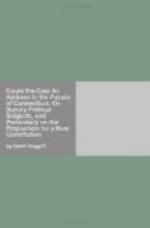Another project zealously supported is that of Districting the State for the choice of Assistants, and Representatives in Congress. The only argument which is urged for the adoption of this measure with any plausibility, is that in the District elections the candidate would be better known. To this argument it may be replied, the State of Connecticut is so limited in its extent, information of all kinds is so generally diffused, and there is such a flood of newspapers that the characters of all the candidates for office may be thoroughly known by all who will bestow any attention to the subject. This State is scarcely more extensive than a single county in many other States, and the intercourse of the inhabitants of the various parts with each other is such that no evil can exist in our present mode of elections—But there are serious and weighty objections against District elections.
1. Such elections open wide the door for intrigue.—As this door, already too widely extended, the most alarming mischiefs enter— mischiefs which sap the foundations of an elective government by corrupting the minds of the freemen and this converting an election ground into a theatre on which is displayed the most vile and demoralizing practices. Let the reader satisfy himself as to the truth of this observation by examining the history of an election in the Southern States, where this mode alone is adopted. Let him learn that they candidates for office and his host of dependents and tools, are employed for weeks before and on the days of election, in the most infamous intrigues, and that falsehood and bribery are so much in fashion, and are so universally resorted to, that success invariably attends the most impudent and the most profligate, while the man of modesty and virtue, though possessing the fairest claims to promotion, is abashed, confounded and overwhelmed.
2ndly. The candidate when elected becomes the creature of the district and not the ruler of a State—He is and must be devoted to the interest of that portion of the community which has elected him, and their views and schemes must be patronized though they oppose the welfare of the whole.
3rdly. Such elections do not secure the best talents. If talents and worth are of consideration, surely they should be at the command of the public. It is of no moment where a man dwells, but it is of immense importance that he be a wise man rather than a fool—a man of integrity rather than a knave.
4thly. Experience, the only save and unerring guide, is altogether in favor of elections at large rather than by Districts. The representation of this State in Congress has ever been of the most respectable character—It is not too much to say that no State in the Union can justly claim a superiority to Connecticut in this respect. The fame may be affirmed, with truth, of the upper house of the Legislature of this State. Has there not been a constant succession of able and wise men in that branch of the administration of Connecticut? For more than a century we have preserved an unexampled prosperity.—shall we hazard our interests on the speculations of zealous partizans who are constantly bewildering themselves and their followers in new schemes?




